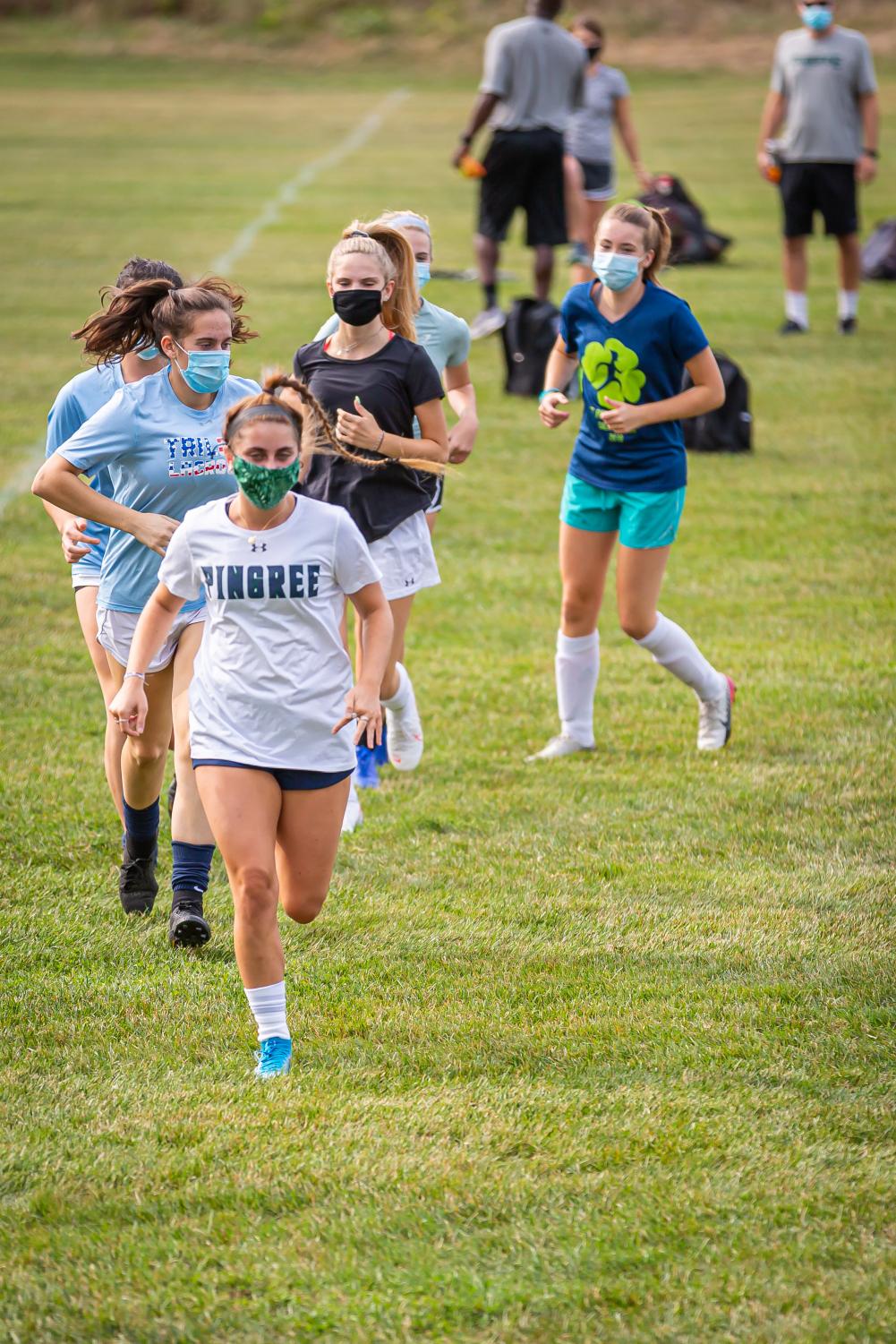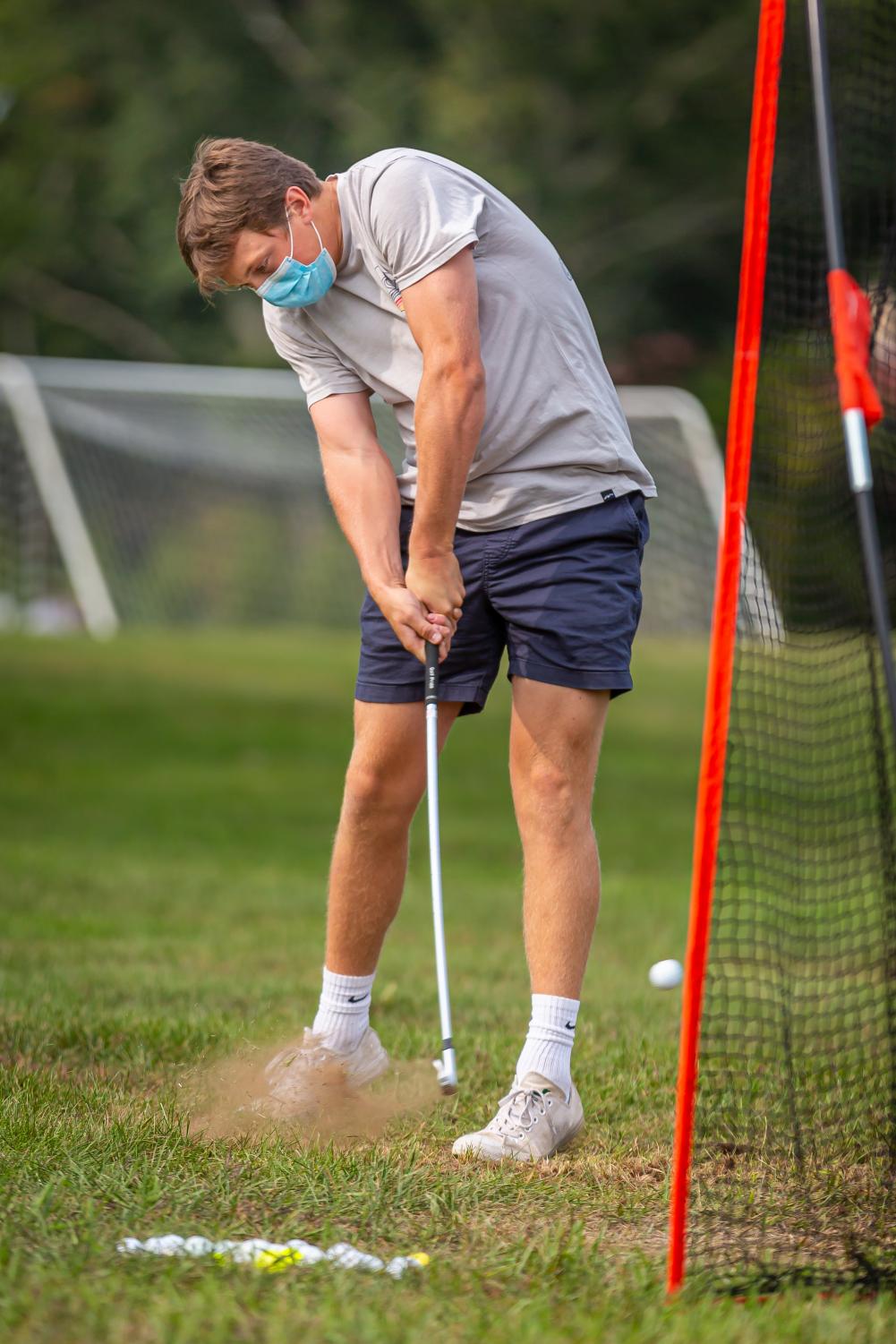Socially-Distanced Sports
November 9, 2020
Pingree’s co-curricular activities have always been a key part of the school’s community feel, and the athletics staff here is determined to maintain the integrity of our sports programs even through the uncertain presence of COVID-19.
Betsy Kennedy, the athletic director here at Pingree, explains that when planning for the fall athletics season, the staff “started by looking at two things: defining the goals for our programs, and thinking about how we could accomplish those goals but also follow the health and safety requirements.” These health and safety requirements were taken from the Massachusetts Department of Elementary and Secondary Education (DESE), and they outline modifications such as adding distance, using masks, and making program-specific adjustments in order to keep students at a minimum amount of risk.
“Our phased approach is all based on DESE,” Kennedy notes. “We started a little more conservatively because we wanted to make sure we could get everyone back on campus safely. We hoped that for the start of school, we could get [the program] up and running.”
There are three DESE phases, and each Pingree sport is in a different phase depending on the level of contact it involves. Phase one is very much focused on individual skills and drills, anything that can be done on your own. The difference between phases one and two is that Pingree is introducing more competitive play (for teams). It’s all still modified, but they can do more team practices and scrimmages. Moving to phase three, the difference is primarily that we have the potential to have outside competition, playing against other schools.
In early October, here is how the Pingree sports teams were moving through the three phases.

Photo by David Goff
Soccer
Soccer, like most other sports, was required to start their season slowly. DESE safety modifications impacted the drills that could be carried out in practice. Girls soccer Head Coach Doc Simpson explains: “We try to make sure we run exercises where there’s no handling of the ball. For the most part, it’s business as usual, with the school guidelines.”
Both the girls and boys soccer coaches hope their players will see game time this fall. Boys soccer Head Coach Dominic Fitzpatrick hopes to play, but says, “We have to make sure everything’s going well here and everyone’s staying healthy, first and foremost.”
It’s not just the coaching staff who’d like to play games. Senior Lexi Gudaitis is eager to get the season started at a bit of a faster pace. “I think we should have a set [game] schedule already in the books, considering public schools have that. Some have set schedules already and some have start dates, and even Massachusetts said we can start playing games by early October, and the fact that we don’t have a set schedule yet kind of concerns me.”
Phase one has drastically limited the team’s “normal” practice and game schedule. The adjustments have taken some getting used to – and the players and coaching staff are the first ones to acknowledge that.

Field Hockey
The varsity field hockey team has started off slowly in phase one, following DESE’s instructed modifications. Coach Jen Richardson explains the unique challenges for field hockey players during this time. ”We can’t have contact,” she says.”and that means no defense is allowed right now, which is frustrating.”
Despite these setbacks, the team is very excited to be playing this season. “I’m super grateful that we get to be out here,” says Senior Kate Hill. “I know for a lot of schools, it’s really uncertain whether they’ll have a season or not. So I’m just super grateful we get to come out here after school and practice and just be together, even if it’s socially distanced.”
Looking forward, coach Richardson explains that phase three may bring competition into the picture, but it will definitely be different from past seasons. “Although we won’t be able to play our typical IEL schedule, there may be schools within the NEPSAC or maybe even public schools that will be looking to create some competition.” The team is excited for what’s to come, and hopes to play games as soon as it’s safe to do so.
Volleyball
Volleyball has had one unique adjustment to make to their season, and that’s the fact that they’re required to play outdoors. Almost every other fall sport has the advantage of playing on a field or course, or running on trails outdoors, but volleyball is primarily an indoor sport in a time when playing indoors is not allowed. The transition has been difficult. As head coach Lara Garrett explains, “It’s a totally new thing for us, dealing with the elements and everything.”
On the possibility of moving indoors at a later time, Garrett says: “There are pods on our courts, but I’m sure we’ll know sooner about going inside. Right now we’re trying to stay far enough apart, so we’re not really getting 6-on-6 play right now. We’re doing more individual drills and skills. More than four girls usually aren’t on the court at the same time. We’ll add in more team development stuff.”
According to Betsy Kennedy, it’s unlikely that fall sports will move indoors, but she is more hopeful for the winter season. Volleyball team captain Katherine Silacci takes me through her thoughts on getting used to this new set-up: “There are a lot of weird regulations to get used to. There’s a three foot line preventing us from getting to the net, which makes it hard for blocking and hitting. Other than that, I’ve been happy to get to know the freshman, since otherwise I don’t see them much. Trying to keep a positive attitude has been my main goal because we have a lot of new players. I’ve just been trying to make it fun.” Volleyball may be able to hold scrimmages in the future, but the location is still very up in the air.
Cross Country
Cross country has been able to start up their season with minimal changes other than the use of social distancing and masks. Coach Jim Maclaughlin says, “Right now, we’re wearing masks like everybody else, especially when we’re grouped up and stretching. As the kids are out on the trails, sometimes they may lower their masks a little bit to get a breath, but they can’t do that when they’re around anybody. We’re also really emphasizing that people not run close together. We spread out.”
Due to its outdoor space advantages, cross country is one of only two athletic programs currently allowing students to remove their masks at times. The only major difference is the lack of competition. Hopefully this will come soon. Senior Phoebe Kellogg has an idea she’d love to see implemented. “I think everyone’s kind of bummed out that the teams got cut in half, so if we could do cross-team activities (like an activity where the cross country team races boy’s soccer) to get everyone excited during this odd season, that would be great.”
Dance
Dance, like volleyball, is an indoor athletic program that has been moved outdoors for the season. Practices currently take place in the freshman arts tent by the junior pod area. “We’re so excited, and the weather has been beautiful for us to work out here,” says coach Tennille Hahn. “We’re staying at least six feet apart and reminding everyone \ to spread out. We are taking breaks when we need water. We’re walking over 12 feet away from each other and facing a different direction. We’re sanitizing throughout, every time we need a break. We’re wiping down the chairs, just following regular guidelines.”
Although the dance team includes phases, they plan on wearing masks throughout the season. Captain Jordan Coccoluto says, “I would like to be able to compete, but I don’t want to be pushing the limits because I want everyone to stay safe.” There is a planned virtual dance concert on November 12th and 13th and the possibility of competition at a later date in the season.
Golf
Similar to cross country, golf has some leniency on wearing masks due to their location and ability to space out. Originally, they were located at the school, but have since been given the go-ahead to move off-campus to the Wenham Country Club. Coach Robert Rao explained, “When [the students] come around the golf course, they make sure to wear their masks. When they get on the course, they can actually let their mask go, as long as they’re socially distanced at that point.”
He added that golf is ahead of most other programs as far as “phases” go, since golf is one of the only sports truly able to be played normally during this time. He clarified that COVID-19 hasn’t affected the program nearly as much as it has others, and they have the ability to resume competition next week.
Football
Football may be the program most heavily affected by COVID-19 because it is a contact-heavy sport in a time where contact is frowned upon. As of now, they aren’t able to practice with pads on, and are required to wear masks. “We have three phases,” Coach Mike Flynn explains. “During our next phase, we’re able to have helmets and shoulder pads, and the third phase is full pads and more contact. I think phase two is a reasonable goal for us, but phase three… maybe not. If we can get to phase two, I’d be happy with that.”
Senior Paul Larrabee, who just committed to Bates, describes the unusual college recruiting process this year. “I wasn’t able to go to any camps this summer, so it was all based on my junior year film. There were a lot of online Zooms, talking with coaches.” COVID-19 restricted Larrabee’s recruitment process, and the uncertainty of this season was a main factor in his commitment.
There has been talk throughout Pingree of possibly moving the football season to February, as other schools have begun to make that schedule change in hopes of being able to play games. Coach Flynn says that in theory, starting in February would be a perfect window for Pingree. “ Games would be great for these kids, and they’ve earned it.But logistically and realistically, we don’t know what will happen.”
Early November update:
All Pingree athletic programs have continued to make their way through each of the three phases. For some sports, like volleyball, not much has changed, except for the addition of full team Wednesday practices that have been implemented throughout each program. Other sports like boy’s soccer and golf have had the opportunity to play their first game of the season. Boys soccer traveled to Berwick Academy on October 28th and played them to a 1-1 tie. The rules have been modified to fit each school’s safety requirements, but this is a great sign for the winter season. The golf team also was able to compete against Berwick Academy and pulled through with a 7.5-1.5 win. A second round of games were scheduled at Berwick, but had to be cancelled following a new rule banning out-of-state travel. Many varsity sports were able to play end of season games on Saturday, November 14th against Winsor School.

